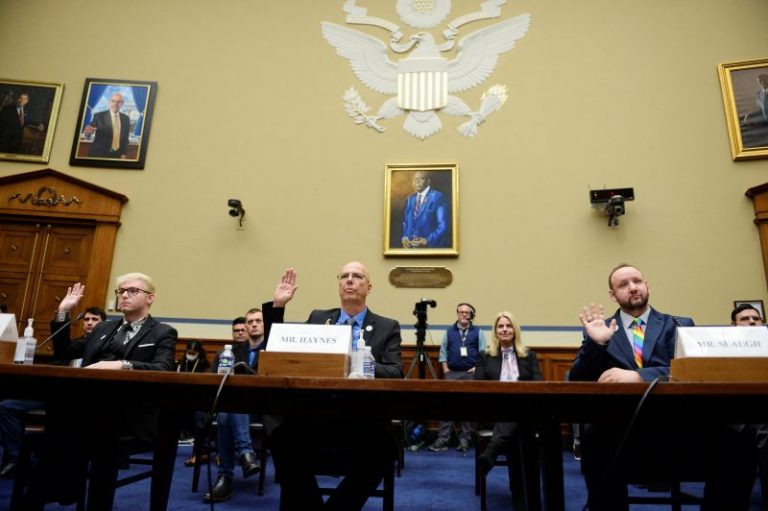LGBTQ activists and survivors of the Club Q and Pulse nightclub shootings told the House Oversight Committee on Wednesday, during more than three hours of testimony, that a rise in anti-LGBTQ extremism and violence has left them traumatized and afraid.
Over the past year, they said, extremists in the United States have attacked nearly 150 LGBTQ events. Two dozen hospitals and providers have faced online harassment because they provide gender-affirming care to children, and a record number of transgender and gender-nonconforming people have been slain, they noted. Hate crimes against LGBTQ people have increased 40 percent since 2015, and FBI data shows that in 2020, 1 in 5 hate crimes were motivated by anti-LGBTQ bias.
Those incidents did not occur in a vacuum, said Rep. Carolyn B. Maloney (D-N.Y.), who chairs the committee.
“These actions are the culmination of years of anti-LGBTQ extremism that began in statehouses across the country and spread to social media platforms before boiling over into the communities where we reside,” Maloney said.
Maloney had announced the hearing earlier this week, as a means to examine “how the surge of anti-LGBTQI+ policies advanced by Republican lawmakers and the proliferation of extreme anti-LGBTQI+ rhetoric are fueling a rise in violence against LGBTQI+ people in the United States.” It came less than a month after the Club Q shooting in Colorado Springs and a day after President Biden signed the Respect for Marriage Act.
Wednesday’s hearing opened with testimony from two men who survived the Club Q shooting, in which a gunman killed five people and injured 25. Michael Anderson, a 25-year-old gay man who worked at the bar, said he saw a friend “lying on the floor, bleeding out.”
“I had to tell him goodbye while I continued to fear for my life, not knowing if the attack was truly over,” Anderson said. “I can still hear the rapid firing of bullets today. It’s a sound I may never forget.”
James Slaugh, a fellow Club Q survivor, said he, his sister and his boyfriend all sustained bullet wounds in the attack, and their recovery may be long. Still, he said, it was important for him to travel to D.C. to share what he saw that night and what he has seen across the country this past year.
In all, eight LGBTQ activists testified at length Wednesday about the ways they said anti-gay rhetoric correlated with a rise in attacks on LGBTQ safe spaces.
“Outside of these spaces, we are continually being dehumanized, marginalized and targeted,” Slaugh said. “Hate starts with speech. The hateful rhetoric you’ve heard from elected leaders is the direct cause of the horrific shooting at Club Q.”
The hearing was the third one Maloney has held this year after a mass killing, and it’s likely to be one of the key committee’s last before Republicans take control of the House. Rep. James Comer (R-Ky.), who will take over from Maloney as chair, argued Wednesday that lawmakers need to address not anti-LGBTQ hate specifically but what Republicans described as an increase in violent crime that affects the entire country.
“It’s easier to blame Republicans than have a serious discussion about the rise of violent crimes across the nation,” Comer said. “It’s easier, but it’s also irresponsible and reckless.”
Brandon Wolf, a gay man who watched his best friend die in the attack on the Pulse nightclub in Orlando, has spent the six years since the shooting advocating for gun control and LGBTQ rights. Many committee members during the hearing Wednesday directed their questions to him.
“For years,” Wolf said, “cynical politicians and greedy grifters have joined forces with right-wing extremists to pour gasoline on anti-LGBTQ hysteria and terrorize our community.” He specifically called out “my own governor, Ron DeSantis,” who he said “has trafficked in that bigotry to feed his insatiable political ambition and propel himself toward the White House.”
Rep. Pat Fallon (R-Tex.) pushed Wolf to stop blaming Republicans and admit that the gunman had pledged allegiance to the Islamic State.
“The evil individual that murdered 49 and wounded 53 and probably gives you nightmares and will for the rest of your life, it was not a right-wing extremist,” Fallon said.
Wolf said later that “no one is asking for anyone but the shooter at Club Q to be on trial in Colorado Springs.”
“But what we are saying is that people should be accountable for the things that come out of their mouths,” he said. “When you’re willing to traffic in cheap shots and bigotry against a marginalized community that’s already seeing hate against it on the rise, that’s already seeing violence rising across the country, when you’re willing to traffic in those things to score political points, you have to be accountable for what happens next.”
Rep. Rashida Tlaib (D-Mich.) asked Wolf how the country should move forward. Wolf told her that after the June 2016 Pulse shooting, his community faced a choice on whether “we were going to succumb to terrorism and hate” — and people from both parties came together. Faith leaders showed up for LGBTQ people, and conservatives agreed to make Orlando safer and more inclusive for gay people like him.
“I think that offers a blueprint for how this country moves forward in the wake of such violence and hate,” Wolf said.

